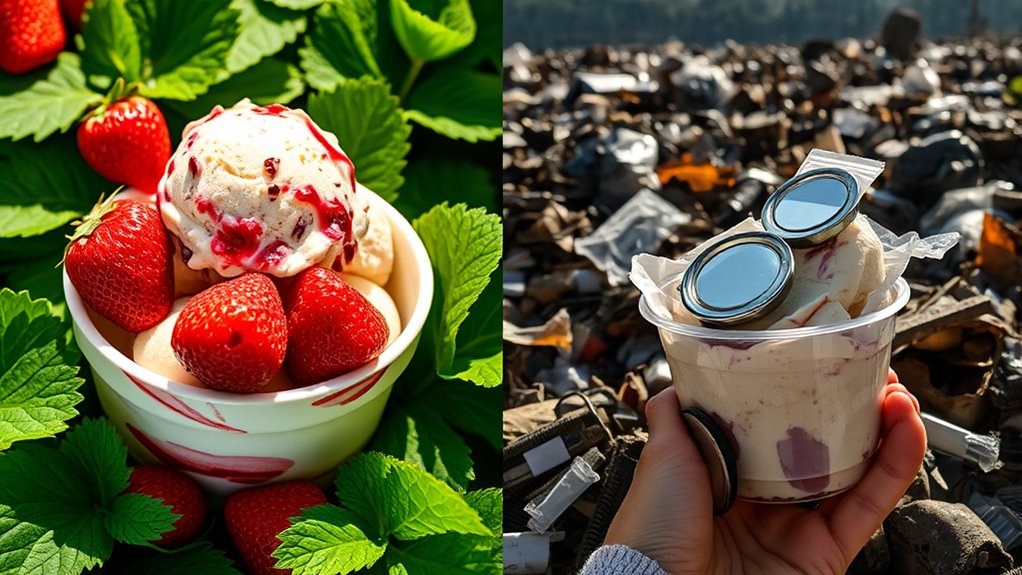When you choose organic ice cream, you’re opting for a treat made from natural ingredients, free of synthetic chemicals and artificial flavors. Organic ice cream uses milk from pasture-grazing cows and organic cane sugar, resulting in a richer flavor and creamier texture. In contrast, non-organic ice cream may have additives and uses lower-quality ingredients. You’ll find that the health benefits and environmental impacts differ markedly. Discover what else sets these ice creams apart!
Key Takeaways
- Organic ice cream is made from certified organic ingredients, while non-organic may contain artificial flavors, preservatives, and additives.
- Organic ice cream generally has higher nutritional value, with no harmful additives or artificial ingredients.
- The production of organic ice cream supports sustainable farming practices, promoting soil health and animal welfare.
- Organic ice cream often features richer flavors and smoother textures due to the quality of its natural ingredients.
- Consumers perceive organic ice cream as a premium product, justifying its higher price compared to non-organic alternatives.
What Defines Organic Ice Cream?

Organic ice cream stands out for its commitment to natural ingredients and sustainable practices. You’ll find that it’s made from organic milk sourced from pasture-grazing cows, ensuring no synthetic fertilizers, pesticides, or GMOs are present.
The sugar used is typically organic cane sugar, enhancing flavor without harmful chemicals. All fruits and produce comply with USDA organic guidelines, which ban artificial flavors, colors, and preservatives. This means you can enjoy a variety of organic ice cream flavors without worrying about additives.
Additionally, organic ice cream often includes guar gum for a creamy texture, steering clear of artificial emulsifiers found in non-organic options. By choosing organic, you’re opting for a product that’s purer and better for the environment.
Key Differences Between Organic and Non-Organic Ingredients

When you compare the ingredients in organic and non-organic ice cream, it becomes clear how the choices affect both flavor and health.
Organic ice cream features ingredients grown without synthetic fertilizers, pesticides, or GMOs, ensuring a more natural treat. In contrast, non-organic ice cream often includes artificial flavors, preservatives, and additives that can diminish quality. Additionally, high sugar and fat content in non-organic options may lead to health concerns if consumed excessively. The average ice cream consumption per person in the U.S. is about 23 pounds annually, highlighting the importance of ingredient choices.
Organic ice cream uses natural ingredients free from synthetic additives, while non-organic options may compromise quality with artificial elements.
The milk used in organic options comes from pasture-grazing cows, while conventional dairy may contain antibiotics and growth hormones. Additionally, organic cane sugar enhances flavor without chemicals, unlike non-organic sugars.
All fruits and produce in organic ice cream must adhere to USDA organic guidelines, promoting sustainability. Furthermore, sugar-free vanilla ice cream offers a healthier option that appeals to those with dietary restrictions.
Ultimately, these ingredient differences greatly impact your ice cream experience, influencing both taste and environmental health.
Health Benefits of Choosing Organic Ice Cream

When you choose organic ice cream, you’re not just treating your taste buds; you’re also opting for higher nutritional value.
With natural ingredients free from harmful additives, you can enjoy a guilt-free indulgence that benefits your health.
Plus, the rich flavors and creamy texture make it a delightful choice that supports your wellness.
Nutritional Value Comparison
Choosing organic ice cream not only satisfies your sweet tooth but also offers a range of health benefits that can enhance your overall well-being.
Compared to regular ice cream, organic products are crafted from high-quality ingredients, resulting in higher purity and nutritional value. You won’t find harmful additives or artificial flavors here, as organic ice cream is free from synthetic pesticides and fertilizers.
The organic milk from pasture-grazing cows contributes to a richer flavor and eliminates antibiotics and growth hormones. Plus, the probiotics in organic ice cream can support your digestive health, while natural ingredients promote better nutrient absorption. Additionally, opting for organic ice cream aligns with the eco-friendly solutions that many consumers are seeking today.
Enjoy this guilt-free indulgence that aligns with your health-conscious choices!
Natural Ingredients Advantage
Although indulging in a scoop of organic ice cream, you’re not just treating yourself; you’re also opting for a dessert made with natural ingredients that prioritize your health.
Choosing organic ice cream offers several benefits:
- Quality Ingredients: Made with organic milk from pasture-grazing cows, enhancing flavor and nutrition.
- No Harmful Additives: Free from synthetic pesticides and fertilizers, reducing exposure to harmful chemicals.
- No Artificial Flavors: It’s crafted without artificial flavors, colors, or preservatives, making it a healthier choice.
- Accessible Options: Many brands offer plant-based alternatives for those with lactose intolerance or cow’s milk allergies.
The Environmental Impact of Organic vs. Non-Organic Production

The environmental impact of organic versus non-organic ice cream production reveals significant differences that affect both ecosystems and agricultural practices.
Organic farming avoids synthetic fertilizers and pesticides, promoting healthier soil and ecosystems. This method not only reduces environmental pollution but also enhances biodiversity through practices like crop rotation and sustainable land management.
In contrast, non-organic methods can lead to monoculture and soil depletion, harming the environment. By choosing organic ice cream, you support eco-friendly farming that prioritizes animal welfare and reduces greenhouse gas emissions linked to conventional dairy production.
The increasing demand for organic options reflects a growing consumer awareness of sustainability, emphasizing the benefits of reducing chemical runoff and protecting wildlife habitats compared to non-organic farming.
Understanding the Label: What to Look For

When you’re shopping for organic ice cream, it’s essential to understand the labels.
Look for the USDA organic certification and check the ingredient list for transparency about what’s inside.
Knowing how to read the labels can help you make informed choices and avoid misleading terms.
Organic Certification Standards
Understanding organic certification standards is crucial for making informed choices about ice cream.
When you pick up that tub of organic ice cream, here’s what you should look for:
- USDA Organic Seal: This indicates the product meets strict USDA standards.
- No Synthetic Additives: Ingredients must be free from artificial flavors, colors, and preservatives.
- Natural Farming Practices: Ingredients should come from farms that avoid synthetic fertilizers and pesticides for at least three years.
- Multi-Ingredient Integrity: Verify it doesn’t contain prohibited substances like antibiotics or growth hormones.
Ingredient Transparency Importance
Why is ingredient transparency so vital in choosing your ice cream? When you opt for organic ice cream, you want to guarantee that the ingredients are sourced from reputable farms.
Look for the USDA organic label, which certifies that the milk comes from pasture-grazing cows, free from harmful additives like antibiotics and growth hormones. Ingredient transparency allows you to check for the absence of artificial flavors, colors, and preservatives, making sure you’re enjoying a treat made with natural components.
Understanding the difference between “natural” and “organic” labels is significant; only organic products meet strict standards. By selecting brands that provide detailed information about their ingredients and origins, you can make informed choices that align with your health values.
Label Reading Tips
Ingredient transparency sets the stage for informed choices, and knowing how to read labels can make all the difference when selecting ice cream. Here are some tips to guide you:
- Look for the USDA Organic Seal: This guarantees the product meets strict organic standards without synthetic pesticides or fertilizers.
- Check the Ingredients List: Look for organic milk, organic cane sugar, and natural flavorings that define authentic organic ice cream.
- Beware of Misleading Terms: Descriptions like “natural” or “healthy” aren’t regulated; always seek certified organic labels for assurance.
- Verify No Artificial Additives: Confirm the ice cream contains no artificial flavors, colors, or preservatives, as these are prohibited in organic products.
Popular Organic Ice Cream Brands to Try

If you’re on the hunt for delicious organic ice cream, several brands stand out for their commitment to quality and flavor.
Three Twins Ice Cream focuses exclusively on organic ingredients and is available in over six thousand markets across the U.S. and beyond.
Three Twins Ice Cream is dedicated to organic ingredients and can be found in over six thousand markets nationwide.
Posie Ice Cream Shop emphasizes 100% organic products, sourcing from local farmers markets to guarantee fresh, vibrant flavors.
Scoop Ice Cream Shop, owned by Ray Martin, prides itself on fresh, organic ingredients and a community-focused vibe.
Stonyfield offers a variety of organic ice cream options, prioritizing health and sustainability.
Additionally, brands like Maple Hill and Nancy’s cater to health-conscious consumers with high-quality organic dairy alternatives.
Don’t miss these tasty options!
The Cost Factor: Is Organic Worth It?

While many ice cream lovers might be drawn to organic options for their richer flavors and health benefits, the cost factor can be a significant consideration.
Organic ice cream often costs nearly twice as much as non-organic ice due to several reasons:
- Higher prices for organic ingredients like milk and cane sugar.
- Strict farming practices that elevate production costs.
- Shorter shelf life for organic ingredients, leading to waste.
- Consumers often believe the superior flavor and quality justify the higher price.
Although the upfront cost is steeper, many find that the taste and health benefits make organic worth it.
As demand increases, you might even see lower prices and more options in the future.
The Growing Demand for Organic Ice Cream

As consumers become more health-conscious and environmentally aware, the demand for organic ice cream is rapidly growing. You’re likely noticing a shift in preferences toward healthier frozen dessert options, driven by increased knowledge of the health benefits tied to organic products.
Enhanced transparency in manufacturing processes builds trust between you and organic ice cream brands, making these choices even more appealing. In 2023, the market has expanded with innovative flavors and classic varieties, increasing accessibility for everyone.
This alignment with health-conscious eating trends and rising environmental awareness explains why organic ice cream is capturing the hearts of many consumers. It’s not just a treat; it’s a lifestyle choice that reflects your values and commitment to wellness.
Taste Test: Organic vs. Non-Organic Flavor Profiles

With the rise in popularity of organic ice cream, many of you may wonder how it stacks up against non-organic varieties regarding flavor.
Taste tests often highlight distinct differences in flavor profiles:
- Authenticity: Organic ice cream uses all-natural ingredients, offering a richer taste.
- Creaminess: Without emulsifiers and unhealthy fats, organic options tend to be smoother.
- Sweetness: The use of organic cane sugar results in a more pronounced sweetness.
- Freshness: Many find organic ice cream tastes fresher, sourced from local farmers and seasonal produce.
These factors contribute to a more enjoyable experience, revealing why many consumers prefer organic ice cream over its non-organic counterparts.
Frequently Asked Questions
Is Organic Ice Cream Better?
When you consider whether organic ice cream is better, think about the quality of ingredients.
Organic options often use milk from pasture-grazed cows and avoid synthetic additives, which can lead to a richer flavor and creamier texture.
You’ll also appreciate that organic ice cream is free from harmful chemicals, potentially offering more vitamins and minerals.
Plus, by choosing organic, you’re supporting sustainable farming practices that benefit the environment.
It’s a win-win!
What Does Organic Mean in Ice Cream?
When you see “organic” on ice cream, it means the ingredients come from sources that meet strict USDA guidelines.
You’re enjoying milk from pasture-grazing cows, and the fruits and other components are grown without synthetic fertilizers or pesticides. This guarantees higher quality and animal welfare.
Plus, organic sugar enhances the flavor without harmful chemicals.
Does Organic Half and Half Taste Different?
Yes, organic half and half does taste different!
You’ll likely notice a richer, creamier flavor because it comes from pasture-grazed cows that are fed organic feed. Without synthetic additives or preservatives, it offers a fresher taste that many find more appealing.
Plus, the absence of artificial flavors and growth hormones leads to a more authentic dairy experience. If you appreciate quality, you might prefer the enhanced flavor profile of organic half and half.
What’s the Healthiest Ice Cream to Eat?
When you’re choosing the healthiest ice cream, look for options with natural ingredients and fewer additives.
Ice creams made from whole ingredients, like organic milk and real fruit, often offer better nutrition. Check for lower sugar content and avoid artificial flavorings.
Consider those with added probiotics, as they can support gut health.
Ultimately, your best choice balances taste and health, so you can enjoy a treat without compromising your well-being.
Conclusion
To sum up, choosing organic ice cream not only supports sustainable farming practices but also benefits your health. Did you know that organic dairy farms use 30% less energy than conventional ones? By opting for organic, you’re not just indulging in a delicious treat; you’re also making a positive impact on the environment. So next time you’re at the store, consider grabbing a pint of organic ice cream and enjoy the flavors while supporting a healthier planet.










